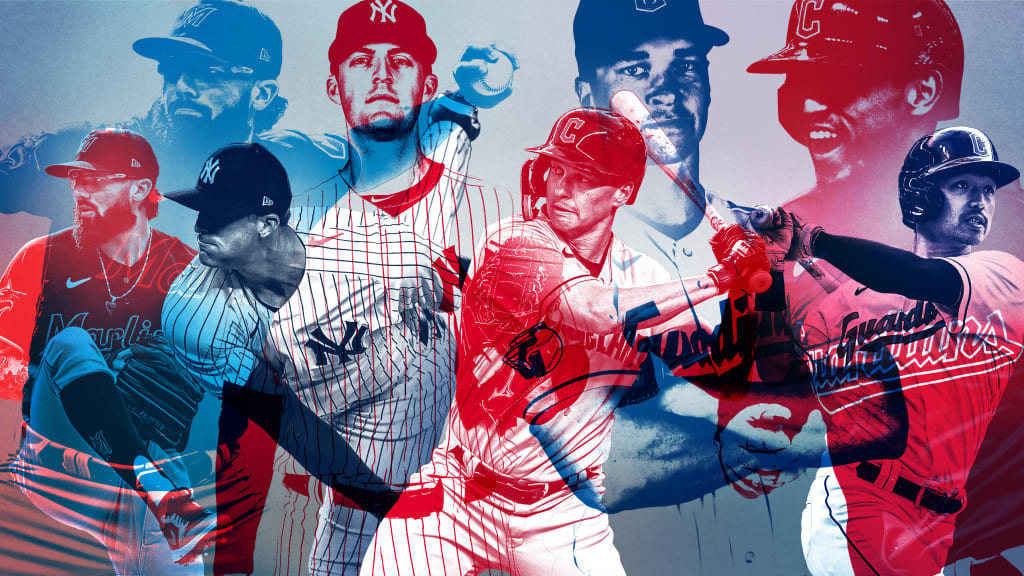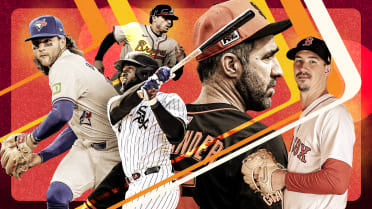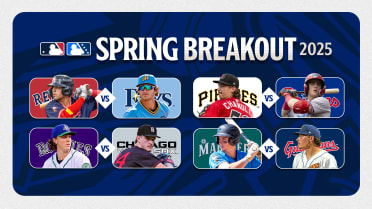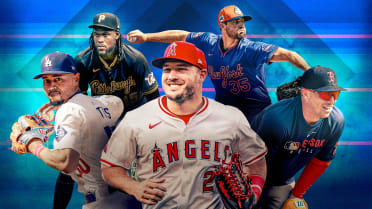Think MLB stars are immune to imposter syndrome? Think again

The end of last season was a whirlwind for Guardians outfielder Will Brennan.
After opening the season at Double-A Akron, he earned a mid-May promotion to Triple-A Columbus, where he hit everything in sight, forcing his way to a late-season callup during the Guardians’ run toward an AL Central crown. By the time October rolled around, Brennan introduced himself on the national stage with a two-out, pinch-hit RBI single in a key spot against the Yankees in the American League Division Series.
“A year ago, I was a suspect, not a prospect,” Brennan joked at Guards Fest in January. “I was someone who was trying to fight for a spot in the game I love.”
But, while that was happening, Brennan was also experiencing imposter syndrome, he revealed. As the season sped along and the stage got brighter, Brennan (who had all of 42 Major League at-bats under his belt before playing in the postseason) began to question his place in baseball -- a familiar doubt to anyone who has ever felt like they did not belong somewhere.
“I may have looked calm on the outside, but on the inside my heart was racing,” Brennan said. “There’s always going to be some imposter syndrome with athletes -- that’s part of the daily struggle, especially with a lot of people’s mindsets -- but there’s a reason we’re here and we’re going to be here for a long time.”
According to Psychology Today, imposter syndrome is when “people believe they’re undeserving of their achievements and the high esteem in which they are, in fact, generally held.” People who suffer from it, “often attribute their accomplishments to external or transient causes, such as luck, good timing or effort that they cannot regularly expend.”
That type of thinking can run rampant in a sport that has failure ingrained in its DNA.
"You hear all the time that you’re considered great when you succeed three times out of 10,” fellow Guardians outfielder Steven Kwan said. “People just think you accept failure seven times, but you don’t. When you’re living your dream, you want to succeed as much as possible, and seven times out of 10 is a lot of failure.”
Tackling mental health challenges like these is important for professional athletes and fans alike. That’s why Major League Baseball took the step of establishing a new social responsibility platform, MLB Together, which launched last week, in the middle of Mental Health Awareness Month. Geared toward fans, the campaign focuses on public awareness and de-stigmatization, while also providing education and resources.
As part of the program, players will share their stories and participate in public service announcements that will air in MLB ballparks, during national and local MLB broadcasts and across MLB media platforms.
No one is immune
For Kwan, imposter syndrome has been pervasive throughout his career. The first time it struck, he was a freshman at Oregon State.
“It just feels like the roof is caving in and walls are closing in, and you’re going to get exposed eventually,” said Kwan, who finished third in AL Rookie of the Year Award voting last season. “You don’t belong, and one day you’re going to get exposed and everybody will know you for the fraud you are.”
That fear is ubiquitous -- whether you’re a professional athlete or an accountant. According to a 2020 study by the Journal of General Internal Medicine, up to 82% of people suffer from imposter syndrome. They often cite the same symptoms Kwan laid out: the feeling that they ultimately will be “found out” or “unmasked.”
“Imposter syndrome is way more common than we think,” said Miami Marlins mental skills coach Marius Aleksa. “I think it's in the coaches. I think it's in the players. I actually think that for most successful players or coaches, there’s going to be at least a little bit of that imposter syndrome.”
The key to unlocking the syndrome’s hold on you, Aleksa said, is making sure that “little bit of doubt” that drives you forward and compels you to work harder doesn’t overwhelm you.
Those feelings tend to echo loudest in the minds of most players during their first couple years in the Majors -- when they’re trying to balance adapting to the game’s highest level with proving their worth in a hyper-competitive and stressful environment.
“Playing next to José Ramírez, one of the top three baseball players in the entire world, isn’t something I take lightly, just like how I don’t take playing under [Guardians manager] Terry Francona lightly,” Brennan said when asked to define what imposter syndrome meant to him.
No one-size-fits-all solution
On April 22, Devin Smeltzer wanted to talk about the mental aspect of his game.
After tossing four scoreless innings in a spot start against the Guardians, the Marlins left-hander stood in the main hallway underneath Cleveland’s Progressive Field and credited his success to his work with the team’s mental skills coaches.
Instead of dwelling on the bad breaks he was getting and how his outing would affect the rest of the bullpen, Smeltzer spent his start intent on executing his next pitch, a level of intense focus that helped him find success.
While Smeltzer said he never felt that he classified any of the mental hurdles he has as imposter syndrome, he’s no stranger to the feelings of uncertainty that can come at the start of a Major League career.
“Earlier in your career, you kind of have this sense of playing with house money because you’re just happy to be there and you’re excited about opportunities,” said Smeltzer, who has endured a whirlwind start to the season. “By your second year you know you belong and then from there things change … there’s so many external factors that sometimes it gets tough to quiet your mind.”
When it comes to quieting his mind, Smeltzer’s go-to tactic is talking with others about his experiences -- something he’s been doing since he entered the league with the Twins in 2019, when he was a wide-eyed rookie trying to figure out how to survive in the Majors.
“Everybody goes through struggles, and you just need to be able to trust the guys around you and ask them how they got through things,” Smeltzer said. “You don’t even have to point-blank open up and say you’re going through something; you can just ask them how they handled something.”
Along with talking to his teammates, Smeltzer also relies on his family, friends and personal mental coaches, a group that he calls his “team outside of his actual team.”
Kwan’s first step in working through his imposter syndrome was to identify what he was feeling. From there, he was able to build a plan to work through his anxieties using meditation and journaling -- a coping strategy he shares with Brennan.
“Meditation allows me to identify those thoughts, especially because I think we have so many subconscious thoughts that run through our mind that we aren’t able to put a finger on,” Kwan said.
Identifying those feelings allows Kwan to acknowledge a thought and let it go, he said.
“We’re able to give power to them, and then realize that you don’t need to feel that way [forever].”
Teammates can be a valuable resource
While players across the Major Leagues experience imposter syndrome and manage their mental health in different ways, everyone interviewed for this story agreed on one fundamental baseline: A supportive clubhouse is the most important thing for a team.
“When you’re able to come in as a young guy and just ask questions to the guys around you, it really helps take some weight off your shoulders,” said Yankees reliever Clay Holmes.
When Holmes first broke into the Majors in 2018 with the Pirates, he immediately fostered relationships with staff veterans Jameson Taillon, Francisco Liriano, Chris Stratton and Kyle Crick, which helped him work through the feelings of imposter syndrome he experienced.
“Some people are able to say, ‘I don’t care, I’m just going to go do my thing,’ and some people do a lot of game planning,” Holmes said. “But the serious question that I think a lot of people wrestle with is, ‘Do I belong?’ and ‘How long will this go on?’”
The Guardians played 17 rookies last season, building a clubhouse culture that addressed the anxieties that players face as they try to establish their careers.
“We have some older vets in here, but I think the older vets kind of are just so used to being like, ‘Whatever, just push it and move on, don’t think about it, things will work out,’” Kwan said. “But with a younger clubhouse, we understand that there are insecurities, and that’s OK.
“It’s part of being human and part of being a baseball player. Being able to bounce those things off each other is really important.”
Not only does an empathetic clubhouse allow players to feel more comfortable on the field, but the ability for players to discuss the vulnerabilities that come with imposter syndrome -- and other mental health issues -- leads to a deeper connection off the diamond as well.
“People are starting to realize that the mental skills part is not this taboo thing, and it’s not something that you have to hide,” Aleksa said. “Everyone’s going through it, so when you’re closer, you’re more willing to have these conversations, and then it takes away that isolation.”
Baseball’s evolving approach to mental health
Players confiding in one another about their struggles is just as fundamental to the sport as the slider or stolen base, Aleksa said, even if being more candid about mental health is a relatively new phenomenon for the league.
“I imagine 30 or 40 years ago they were still working on the mental side; they just might not have had the resources,” Aleksa said. “Now, most teams have resources at the Major League and Minor League level, so it’s really cool to see that field growing.”
In his first season with the Marlins, Aleksa is now one of the numerous mental skills coaches navigating MLB clubhouses. Pretty much every club employs a mental skills or performance coach in some form, and as their presence becomes more commonplace, that in turn allows them to feel more comfortable discussing issues such as imposter syndrome.
“Just like the pitching coach or the hitting coach is going to talk to you about your swing or your pitch, I’m going to coach your mind; the only difference is I can’t see your mind,” Aleksa said. “For imposter syndrome, there might be a little bit of embarrassment, so you then have to verbalize that to someone in order to start talking about it or working on it. Otherwise, you’re just going to stay trapped in your own head, and it can be rough.”
Henry Palattella is a contributor to MLB.com.




